Leading Strategically: CEO Values, Barriers, and Leadership Theories
VerifiedAdded on 2023/01/16
|15
|2408
|20
Report
AI Summary
This report provides a comprehensive analysis of strategic leadership, focusing on the critical values of a CEO and the barriers to effective leadership. It explores essential values such as confidentiality, honesty, excellence, trust, teamwork, and execution, highlighting their significance for organizational success. The report examines Tim Cook's leadership at Apple as a case study, demonstrating how his values have contributed to the company's achievements. It also identifies major barriers to effective leadership, including overlooking errors, resisting assistance, and failing to adapt to change. Furthermore, the report discusses relevant leadership theories, particularly transformational and participative leadership, and reflects on a personal instance of leadership demonstration within the workplace. The findings emphasize the importance of values, strategic leadership, and adaptability for achieving sustainable corporate goals. The report adheres to the assignment brief's requirements, including page length, formatting, and citation guidelines.
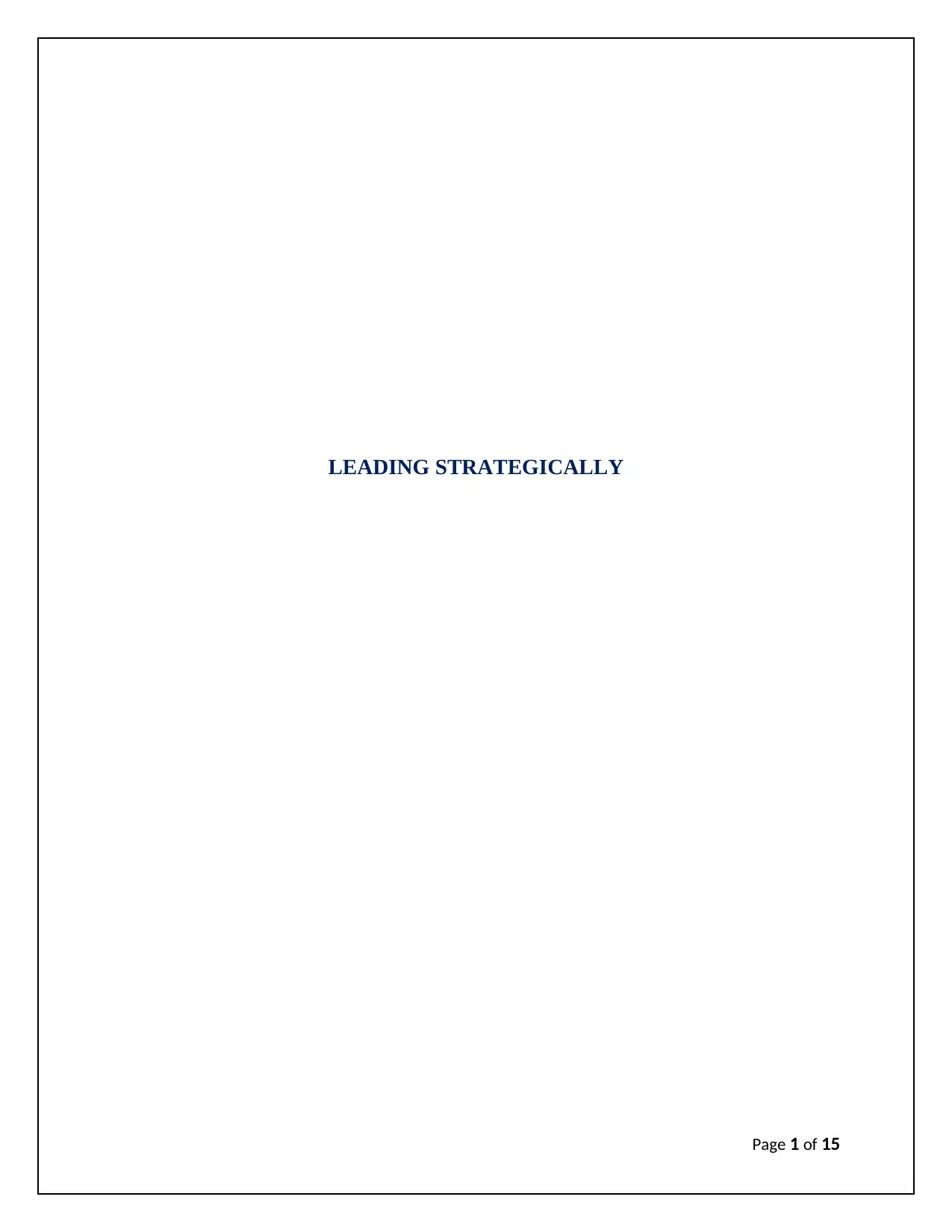
LEADING STRATEGICALLY
Page 1 of 15
Page 1 of 15
Paraphrase This Document
Need a fresh take? Get an instant paraphrase of this document with our AI Paraphraser
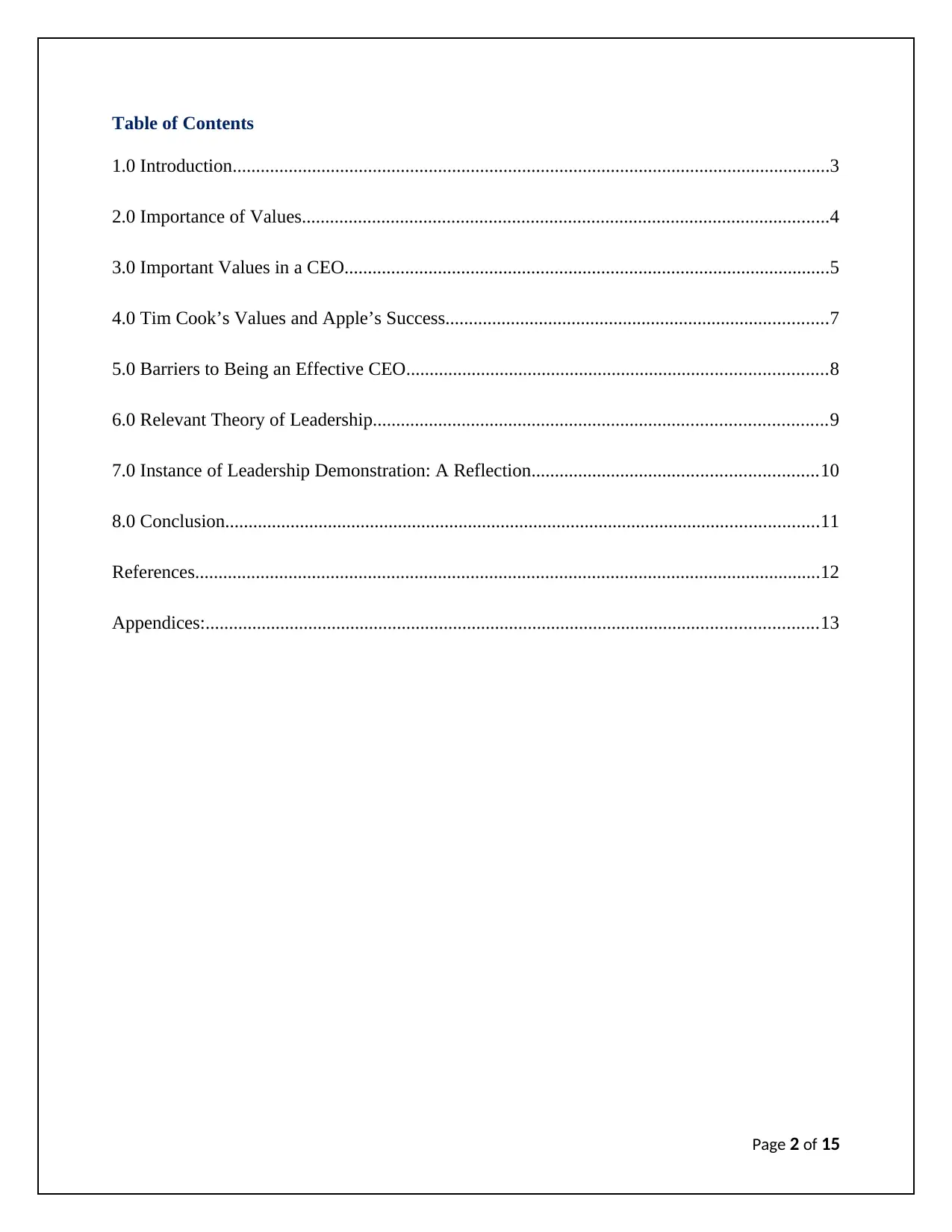
Table of Contents
1.0 Introduction................................................................................................................................3
2.0 Importance of Values.................................................................................................................4
3.0 Important Values in a CEO........................................................................................................5
4.0 Tim Cook’s Values and Apple’s Success..................................................................................7
5.0 Barriers to Being an Effective CEO..........................................................................................8
6.0 Relevant Theory of Leadership.................................................................................................9
7.0 Instance of Leadership Demonstration: A Reflection.............................................................10
8.0 Conclusion...............................................................................................................................11
References......................................................................................................................................12
Appendices:...................................................................................................................................13
Page 2 of 15
1.0 Introduction................................................................................................................................3
2.0 Importance of Values.................................................................................................................4
3.0 Important Values in a CEO........................................................................................................5
4.0 Tim Cook’s Values and Apple’s Success..................................................................................7
5.0 Barriers to Being an Effective CEO..........................................................................................8
6.0 Relevant Theory of Leadership.................................................................................................9
7.0 Instance of Leadership Demonstration: A Reflection.............................................................10
8.0 Conclusion...............................................................................................................................11
References......................................................................................................................................12
Appendices:...................................................................................................................................13
Page 2 of 15
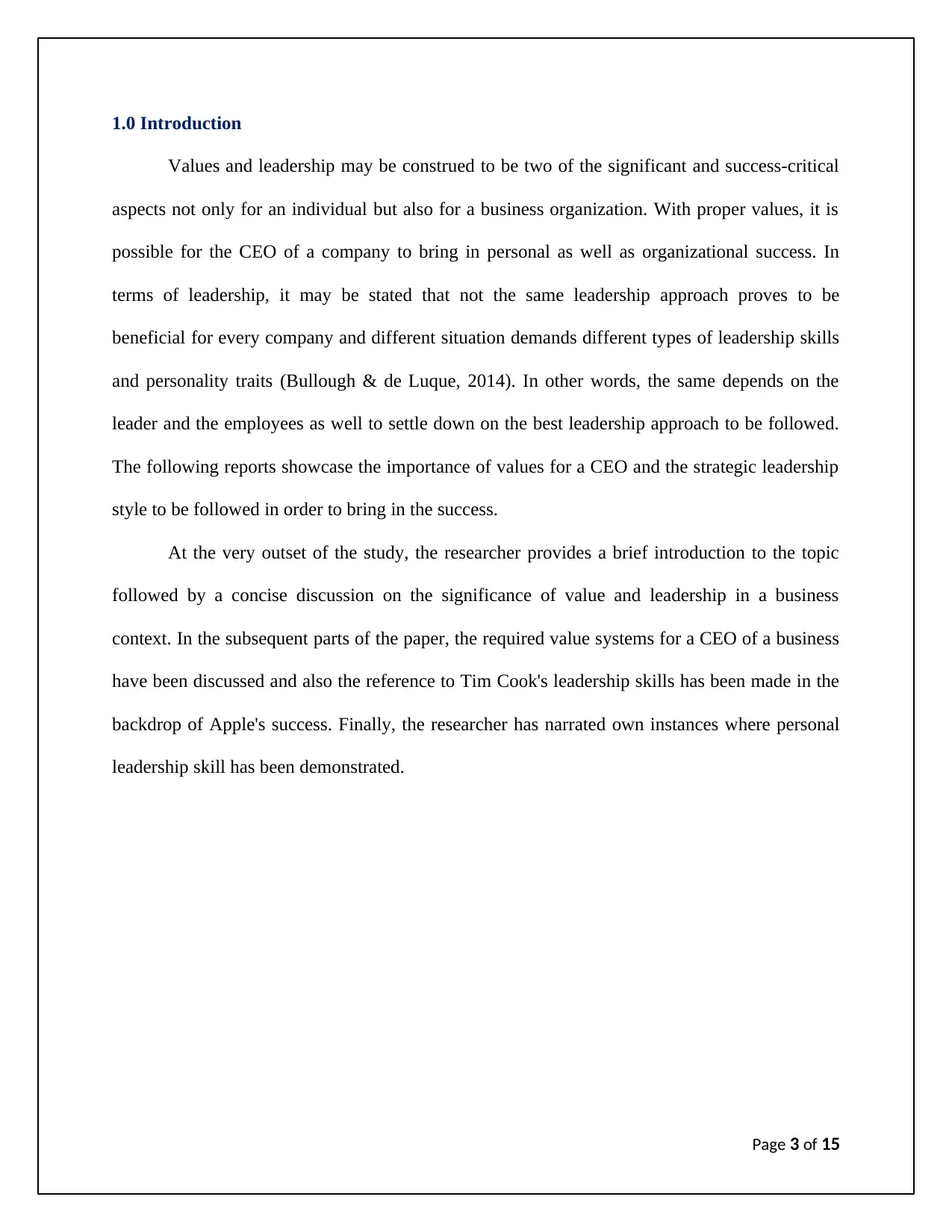
1.0 Introduction
Values and leadership may be construed to be two of the significant and success-critical
aspects not only for an individual but also for a business organization. With proper values, it is
possible for the CEO of a company to bring in personal as well as organizational success. In
terms of leadership, it may be stated that not the same leadership approach proves to be
beneficial for every company and different situation demands different types of leadership skills
and personality traits (Bullough & de Luque, 2014). In other words, the same depends on the
leader and the employees as well to settle down on the best leadership approach to be followed.
The following reports showcase the importance of values for a CEO and the strategic leadership
style to be followed in order to bring in the success.
At the very outset of the study, the researcher provides a brief introduction to the topic
followed by a concise discussion on the significance of value and leadership in a business
context. In the subsequent parts of the paper, the required value systems for a CEO of a business
have been discussed and also the reference to Tim Cook's leadership skills has been made in the
backdrop of Apple's success. Finally, the researcher has narrated own instances where personal
leadership skill has been demonstrated.
Page 3 of 15
Values and leadership may be construed to be two of the significant and success-critical
aspects not only for an individual but also for a business organization. With proper values, it is
possible for the CEO of a company to bring in personal as well as organizational success. In
terms of leadership, it may be stated that not the same leadership approach proves to be
beneficial for every company and different situation demands different types of leadership skills
and personality traits (Bullough & de Luque, 2014). In other words, the same depends on the
leader and the employees as well to settle down on the best leadership approach to be followed.
The following reports showcase the importance of values for a CEO and the strategic leadership
style to be followed in order to bring in the success.
At the very outset of the study, the researcher provides a brief introduction to the topic
followed by a concise discussion on the significance of value and leadership in a business
context. In the subsequent parts of the paper, the required value systems for a CEO of a business
have been discussed and also the reference to Tim Cook's leadership skills has been made in the
backdrop of Apple's success. Finally, the researcher has narrated own instances where personal
leadership skill has been demonstrated.
Page 3 of 15
⊘ This is a preview!⊘
Do you want full access?
Subscribe today to unlock all pages.

Trusted by 1+ million students worldwide
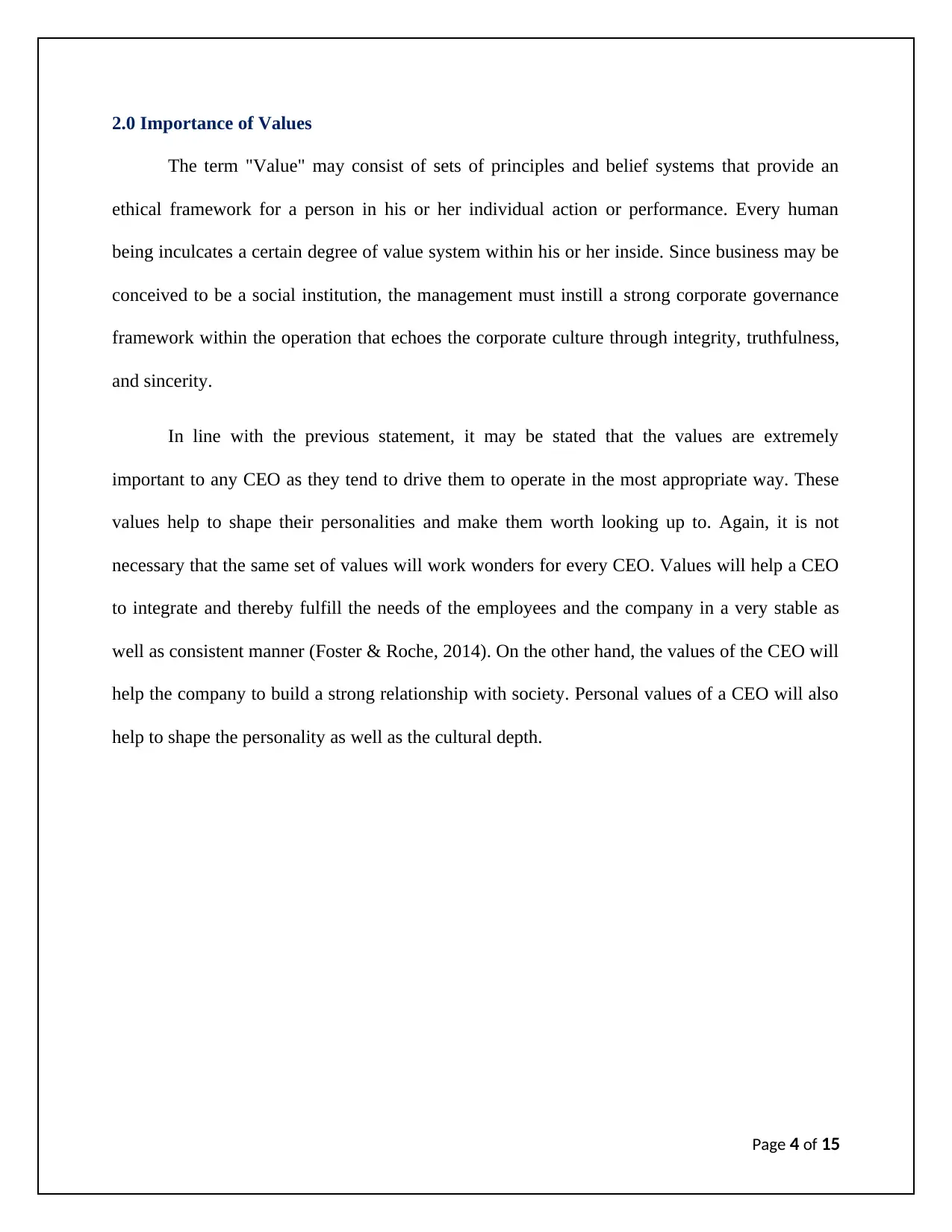
2.0 Importance of Values
The term "Value" may consist of sets of principles and belief systems that provide an
ethical framework for a person in his or her individual action or performance. Every human
being inculcates a certain degree of value system within his or her inside. Since business may be
conceived to be a social institution, the management must instill a strong corporate governance
framework within the operation that echoes the corporate culture through integrity, truthfulness,
and sincerity.
In line with the previous statement, it may be stated that the values are extremely
important to any CEO as they tend to drive them to operate in the most appropriate way. These
values help to shape their personalities and make them worth looking up to. Again, it is not
necessary that the same set of values will work wonders for every CEO. Values will help a CEO
to integrate and thereby fulfill the needs of the employees and the company in a very stable as
well as consistent manner (Foster & Roche, 2014). On the other hand, the values of the CEO will
help the company to build a strong relationship with society. Personal values of a CEO will also
help to shape the personality as well as the cultural depth.
Page 4 of 15
The term "Value" may consist of sets of principles and belief systems that provide an
ethical framework for a person in his or her individual action or performance. Every human
being inculcates a certain degree of value system within his or her inside. Since business may be
conceived to be a social institution, the management must instill a strong corporate governance
framework within the operation that echoes the corporate culture through integrity, truthfulness,
and sincerity.
In line with the previous statement, it may be stated that the values are extremely
important to any CEO as they tend to drive them to operate in the most appropriate way. These
values help to shape their personalities and make them worth looking up to. Again, it is not
necessary that the same set of values will work wonders for every CEO. Values will help a CEO
to integrate and thereby fulfill the needs of the employees and the company in a very stable as
well as consistent manner (Foster & Roche, 2014). On the other hand, the values of the CEO will
help the company to build a strong relationship with society. Personal values of a CEO will also
help to shape the personality as well as the cultural depth.
Page 4 of 15
Paraphrase This Document
Need a fresh take? Get an instant paraphrase of this document with our AI Paraphraser
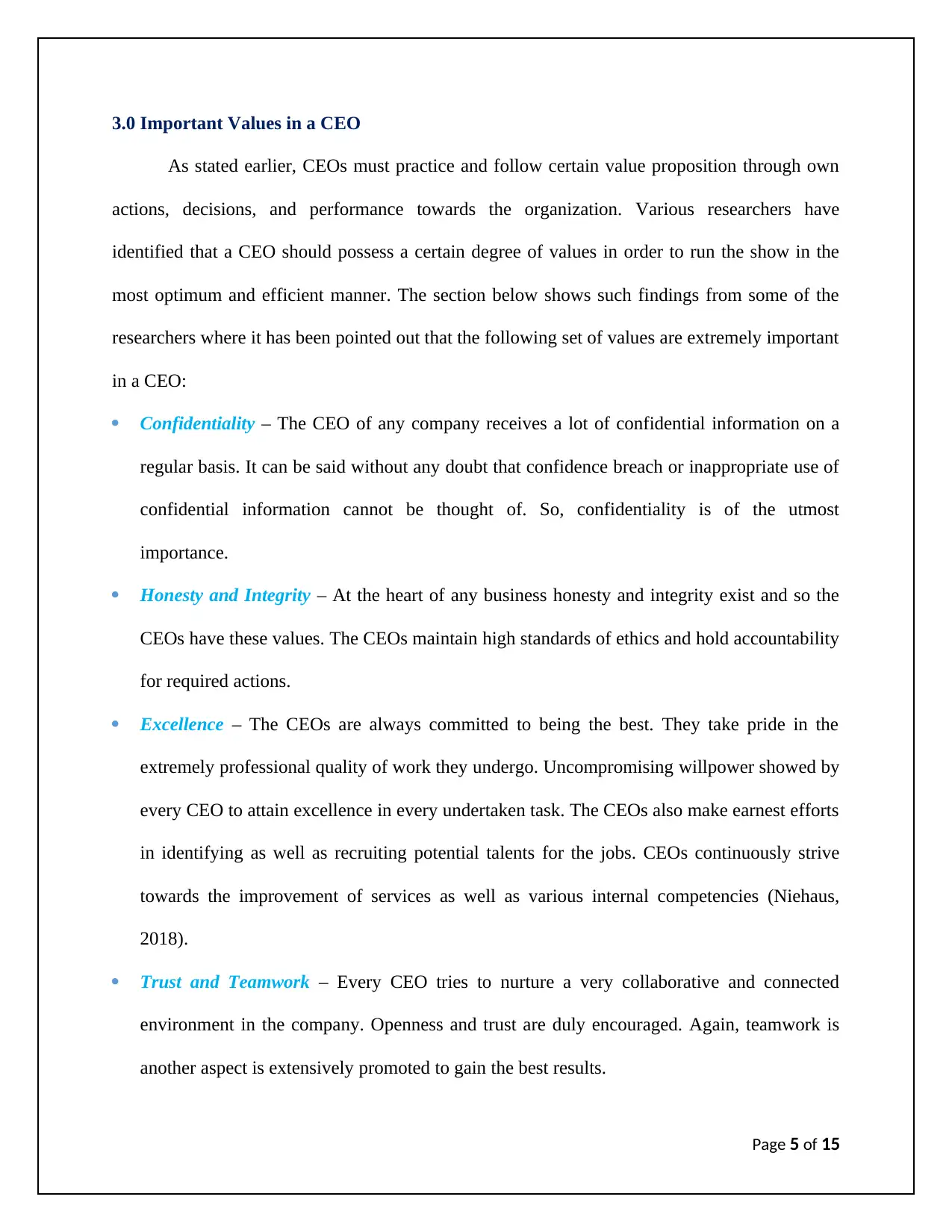
3.0 Important Values in a CEO
As stated earlier, CEOs must practice and follow certain value proposition through own
actions, decisions, and performance towards the organization. Various researchers have
identified that a CEO should possess a certain degree of values in order to run the show in the
most optimum and efficient manner. The section below shows such findings from some of the
researchers where it has been pointed out that the following set of values are extremely important
in a CEO:
Confidentiality – The CEO of any company receives a lot of confidential information on a
regular basis. It can be said without any doubt that confidence breach or inappropriate use of
confidential information cannot be thought of. So, confidentiality is of the utmost
importance.
Honesty and Integrity – At the heart of any business honesty and integrity exist and so the
CEOs have these values. The CEOs maintain high standards of ethics and hold accountability
for required actions.
Excellence – The CEOs are always committed to being the best. They take pride in the
extremely professional quality of work they undergo. Uncompromising willpower showed by
every CEO to attain excellence in every undertaken task. The CEOs also make earnest efforts
in identifying as well as recruiting potential talents for the jobs. CEOs continuously strive
towards the improvement of services as well as various internal competencies (Niehaus,
2018).
Trust and Teamwork – Every CEO tries to nurture a very collaborative and connected
environment in the company. Openness and trust are duly encouraged. Again, teamwork is
another aspect is extensively promoted to gain the best results.
Page 5 of 15
As stated earlier, CEOs must practice and follow certain value proposition through own
actions, decisions, and performance towards the organization. Various researchers have
identified that a CEO should possess a certain degree of values in order to run the show in the
most optimum and efficient manner. The section below shows such findings from some of the
researchers where it has been pointed out that the following set of values are extremely important
in a CEO:
Confidentiality – The CEO of any company receives a lot of confidential information on a
regular basis. It can be said without any doubt that confidence breach or inappropriate use of
confidential information cannot be thought of. So, confidentiality is of the utmost
importance.
Honesty and Integrity – At the heart of any business honesty and integrity exist and so the
CEOs have these values. The CEOs maintain high standards of ethics and hold accountability
for required actions.
Excellence – The CEOs are always committed to being the best. They take pride in the
extremely professional quality of work they undergo. Uncompromising willpower showed by
every CEO to attain excellence in every undertaken task. The CEOs also make earnest efforts
in identifying as well as recruiting potential talents for the jobs. CEOs continuously strive
towards the improvement of services as well as various internal competencies (Niehaus,
2018).
Trust and Teamwork – Every CEO tries to nurture a very collaborative and connected
environment in the company. Openness and trust are duly encouraged. Again, teamwork is
another aspect is extensively promoted to gain the best results.
Page 5 of 15
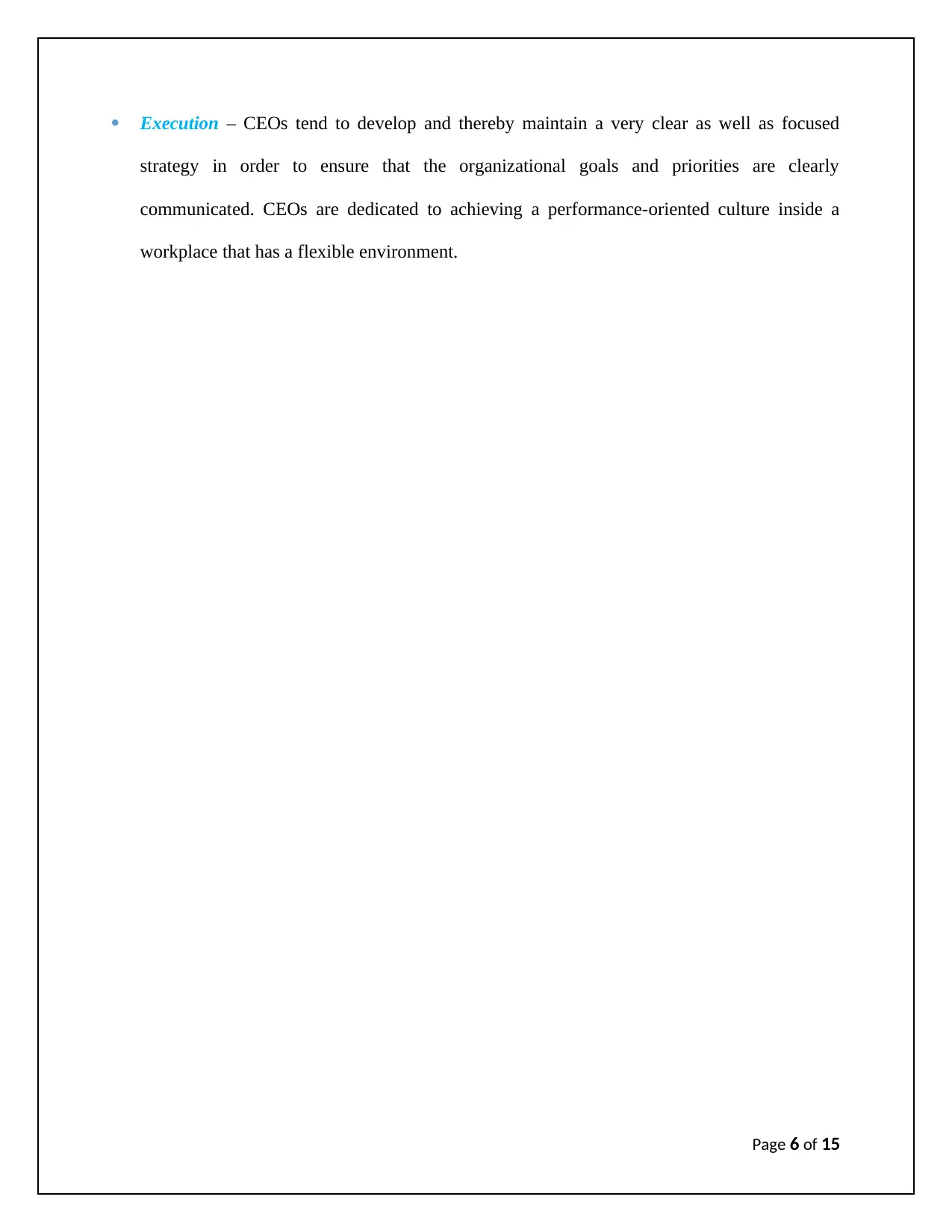
Execution – CEOs tend to develop and thereby maintain a very clear as well as focused
strategy in order to ensure that the organizational goals and priorities are clearly
communicated. CEOs are dedicated to achieving a performance-oriented culture inside a
workplace that has a flexible environment.
Page 6 of 15
strategy in order to ensure that the organizational goals and priorities are clearly
communicated. CEOs are dedicated to achieving a performance-oriented culture inside a
workplace that has a flexible environment.
Page 6 of 15
⊘ This is a preview!⊘
Do you want full access?
Subscribe today to unlock all pages.

Trusted by 1+ million students worldwide
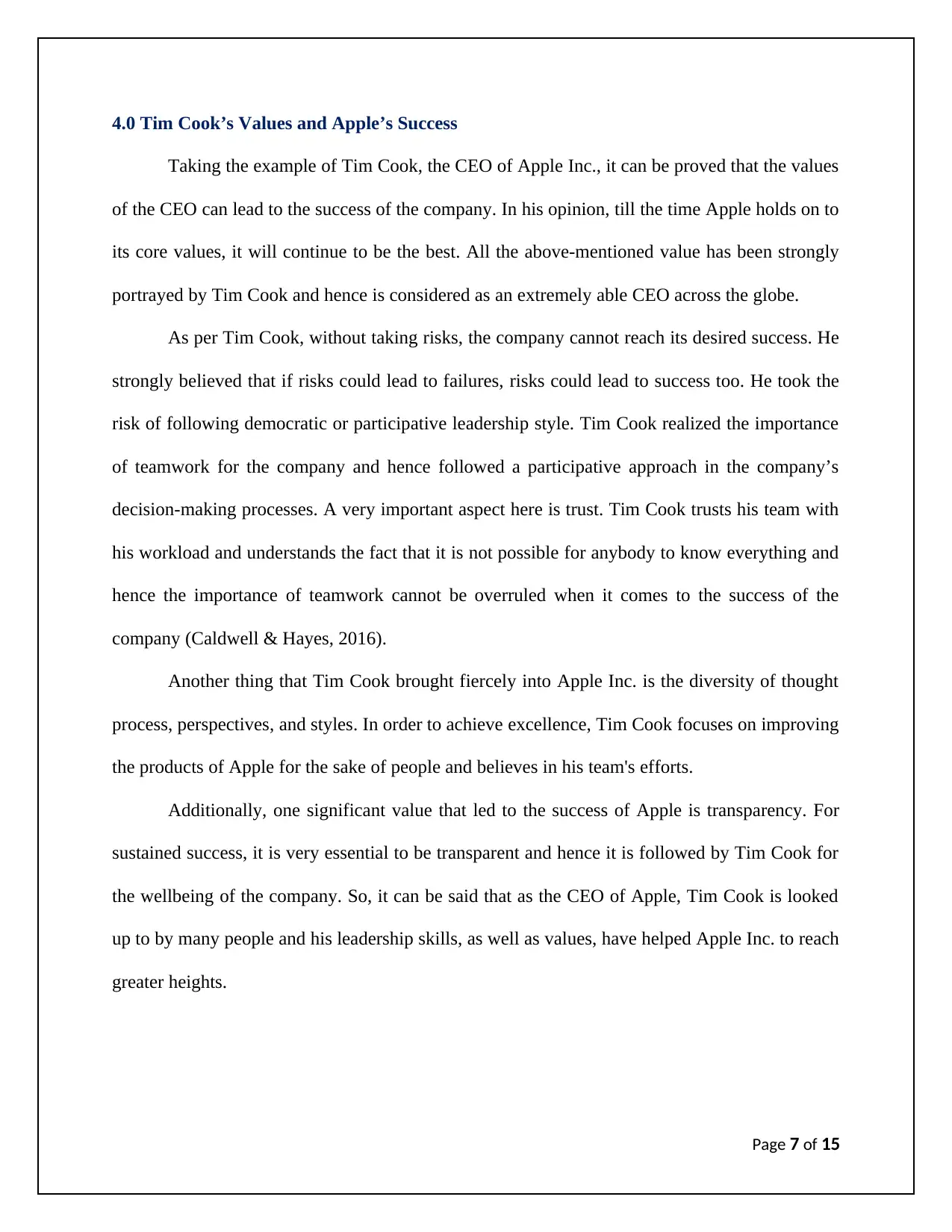
4.0 Tim Cook’s Values and Apple’s Success
Taking the example of Tim Cook, the CEO of Apple Inc., it can be proved that the values
of the CEO can lead to the success of the company. In his opinion, till the time Apple holds on to
its core values, it will continue to be the best. All the above-mentioned value has been strongly
portrayed by Tim Cook and hence is considered as an extremely able CEO across the globe.
As per Tim Cook, without taking risks, the company cannot reach its desired success. He
strongly believed that if risks could lead to failures, risks could lead to success too. He took the
risk of following democratic or participative leadership style. Tim Cook realized the importance
of teamwork for the company and hence followed a participative approach in the company’s
decision-making processes. A very important aspect here is trust. Tim Cook trusts his team with
his workload and understands the fact that it is not possible for anybody to know everything and
hence the importance of teamwork cannot be overruled when it comes to the success of the
company (Caldwell & Hayes, 2016).
Another thing that Tim Cook brought fiercely into Apple Inc. is the diversity of thought
process, perspectives, and styles. In order to achieve excellence, Tim Cook focuses on improving
the products of Apple for the sake of people and believes in his team's efforts.
Additionally, one significant value that led to the success of Apple is transparency. For
sustained success, it is very essential to be transparent and hence it is followed by Tim Cook for
the wellbeing of the company. So, it can be said that as the CEO of Apple, Tim Cook is looked
up to by many people and his leadership skills, as well as values, have helped Apple Inc. to reach
greater heights.
Page 7 of 15
Taking the example of Tim Cook, the CEO of Apple Inc., it can be proved that the values
of the CEO can lead to the success of the company. In his opinion, till the time Apple holds on to
its core values, it will continue to be the best. All the above-mentioned value has been strongly
portrayed by Tim Cook and hence is considered as an extremely able CEO across the globe.
As per Tim Cook, without taking risks, the company cannot reach its desired success. He
strongly believed that if risks could lead to failures, risks could lead to success too. He took the
risk of following democratic or participative leadership style. Tim Cook realized the importance
of teamwork for the company and hence followed a participative approach in the company’s
decision-making processes. A very important aspect here is trust. Tim Cook trusts his team with
his workload and understands the fact that it is not possible for anybody to know everything and
hence the importance of teamwork cannot be overruled when it comes to the success of the
company (Caldwell & Hayes, 2016).
Another thing that Tim Cook brought fiercely into Apple Inc. is the diversity of thought
process, perspectives, and styles. In order to achieve excellence, Tim Cook focuses on improving
the products of Apple for the sake of people and believes in his team's efforts.
Additionally, one significant value that led to the success of Apple is transparency. For
sustained success, it is very essential to be transparent and hence it is followed by Tim Cook for
the wellbeing of the company. So, it can be said that as the CEO of Apple, Tim Cook is looked
up to by many people and his leadership skills, as well as values, have helped Apple Inc. to reach
greater heights.
Page 7 of 15
Paraphrase This Document
Need a fresh take? Get an instant paraphrase of this document with our AI Paraphraser
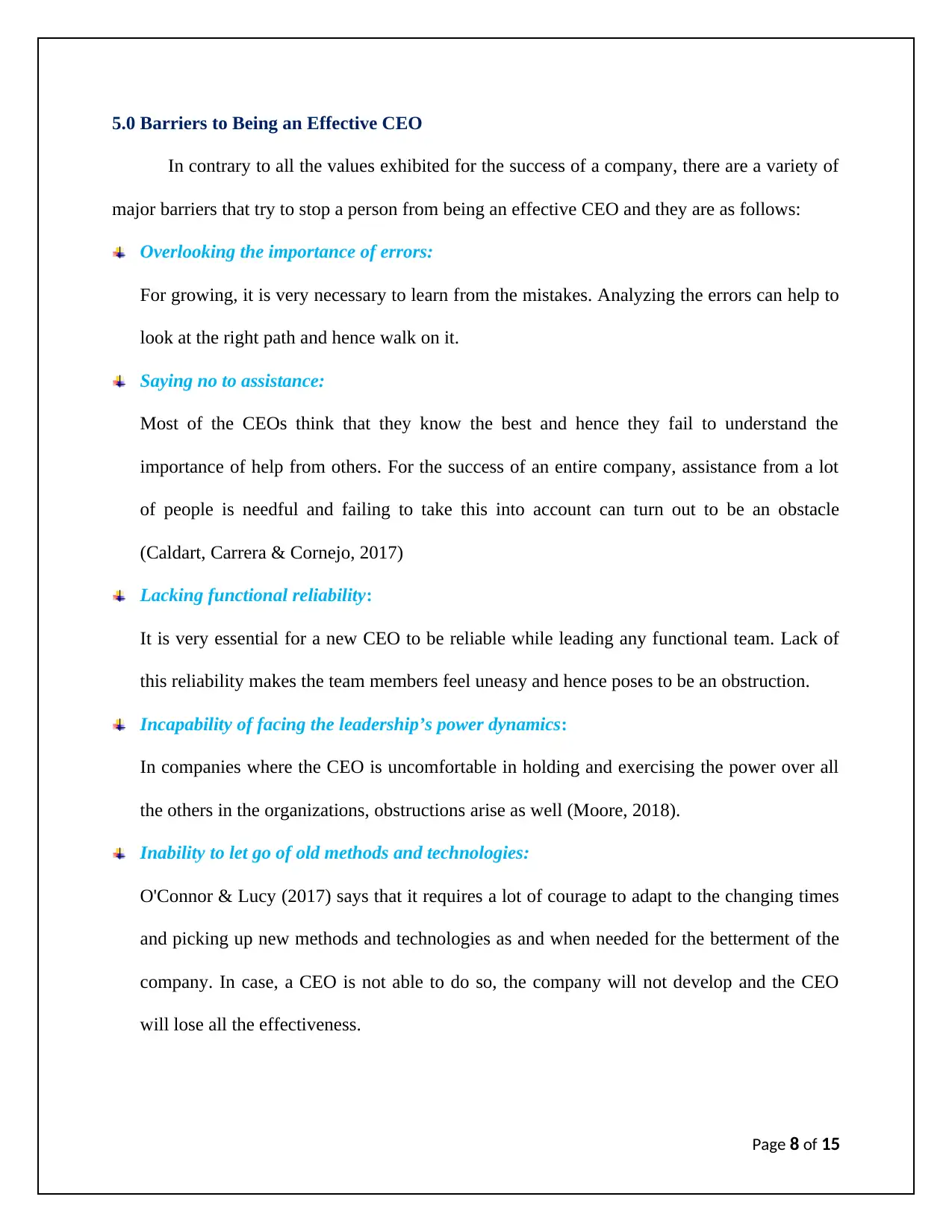
5.0 Barriers to Being an Effective CEO
In contrary to all the values exhibited for the success of a company, there are a variety of
major barriers that try to stop a person from being an effective CEO and they are as follows:
Overlooking the importance of errors:
For growing, it is very necessary to learn from the mistakes. Analyzing the errors can help to
look at the right path and hence walk on it.
Saying no to assistance:
Most of the CEOs think that they know the best and hence they fail to understand the
importance of help from others. For the success of an entire company, assistance from a lot
of people is needful and failing to take this into account can turn out to be an obstacle
(Caldart, Carrera & Cornejo, 2017)
Lacking functional reliability:
It is very essential for a new CEO to be reliable while leading any functional team. Lack of
this reliability makes the team members feel uneasy and hence poses to be an obstruction.
Incapability of facing the leadership’s power dynamics:
In companies where the CEO is uncomfortable in holding and exercising the power over all
the others in the organizations, obstructions arise as well (Moore, 2018).
Inability to let go of old methods and technologies:
O'Connor & Lucy (2017) says that it requires a lot of courage to adapt to the changing times
and picking up new methods and technologies as and when needed for the betterment of the
company. In case, a CEO is not able to do so, the company will not develop and the CEO
will lose all the effectiveness.
Page 8 of 15
In contrary to all the values exhibited for the success of a company, there are a variety of
major barriers that try to stop a person from being an effective CEO and they are as follows:
Overlooking the importance of errors:
For growing, it is very necessary to learn from the mistakes. Analyzing the errors can help to
look at the right path and hence walk on it.
Saying no to assistance:
Most of the CEOs think that they know the best and hence they fail to understand the
importance of help from others. For the success of an entire company, assistance from a lot
of people is needful and failing to take this into account can turn out to be an obstacle
(Caldart, Carrera & Cornejo, 2017)
Lacking functional reliability:
It is very essential for a new CEO to be reliable while leading any functional team. Lack of
this reliability makes the team members feel uneasy and hence poses to be an obstruction.
Incapability of facing the leadership’s power dynamics:
In companies where the CEO is uncomfortable in holding and exercising the power over all
the others in the organizations, obstructions arise as well (Moore, 2018).
Inability to let go of old methods and technologies:
O'Connor & Lucy (2017) says that it requires a lot of courage to adapt to the changing times
and picking up new methods and technologies as and when needed for the betterment of the
company. In case, a CEO is not able to do so, the company will not develop and the CEO
will lose all the effectiveness.
Page 8 of 15
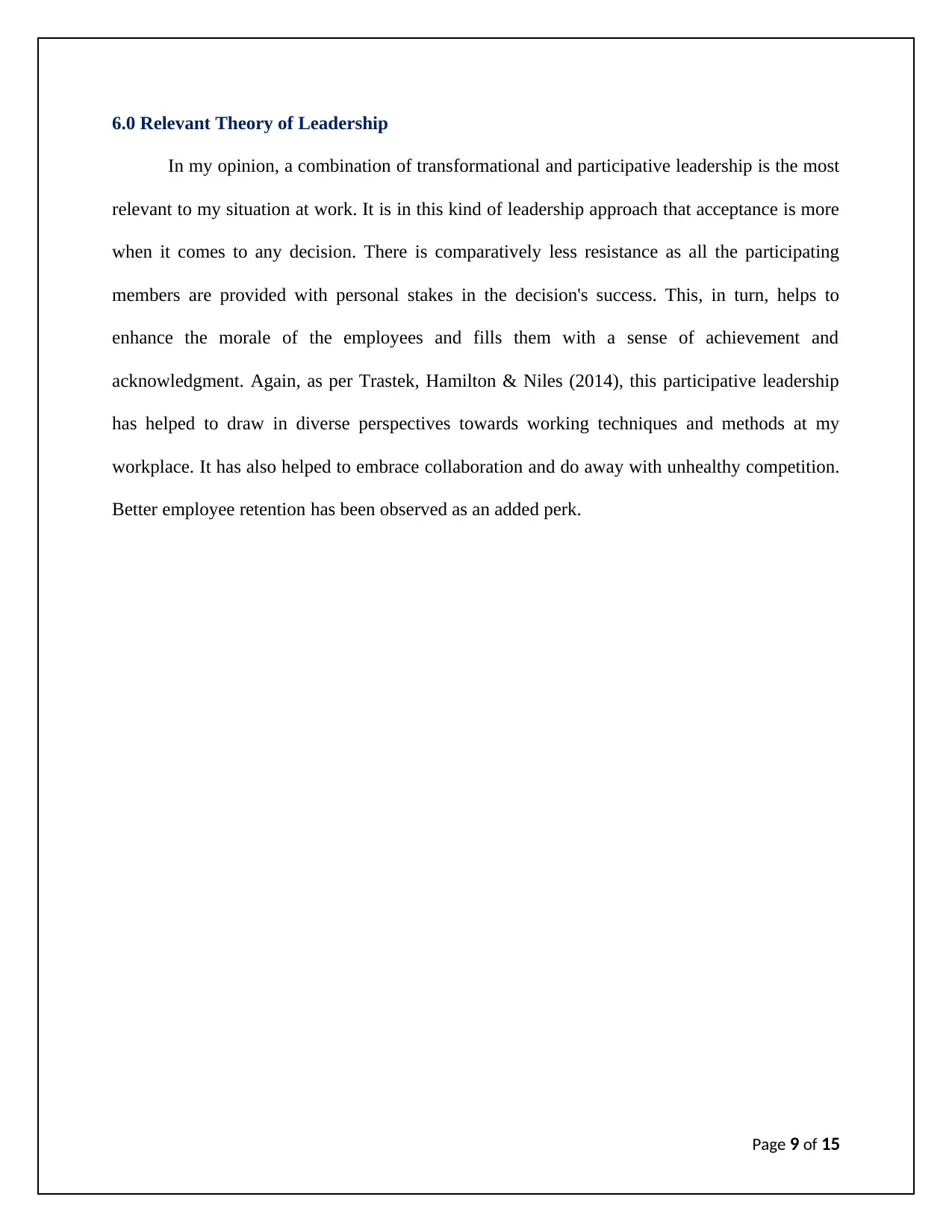
6.0 Relevant Theory of Leadership
In my opinion, a combination of transformational and participative leadership is the most
relevant to my situation at work. It is in this kind of leadership approach that acceptance is more
when it comes to any decision. There is comparatively less resistance as all the participating
members are provided with personal stakes in the decision's success. This, in turn, helps to
enhance the morale of the employees and fills them with a sense of achievement and
acknowledgment. Again, as per Trastek, Hamilton & Niles (2014), this participative leadership
has helped to draw in diverse perspectives towards working techniques and methods at my
workplace. It has also helped to embrace collaboration and do away with unhealthy competition.
Better employee retention has been observed as an added perk.
Page 9 of 15
In my opinion, a combination of transformational and participative leadership is the most
relevant to my situation at work. It is in this kind of leadership approach that acceptance is more
when it comes to any decision. There is comparatively less resistance as all the participating
members are provided with personal stakes in the decision's success. This, in turn, helps to
enhance the morale of the employees and fills them with a sense of achievement and
acknowledgment. Again, as per Trastek, Hamilton & Niles (2014), this participative leadership
has helped to draw in diverse perspectives towards working techniques and methods at my
workplace. It has also helped to embrace collaboration and do away with unhealthy competition.
Better employee retention has been observed as an added perk.
Page 9 of 15
⊘ This is a preview!⊘
Do you want full access?
Subscribe today to unlock all pages.

Trusted by 1+ million students worldwide
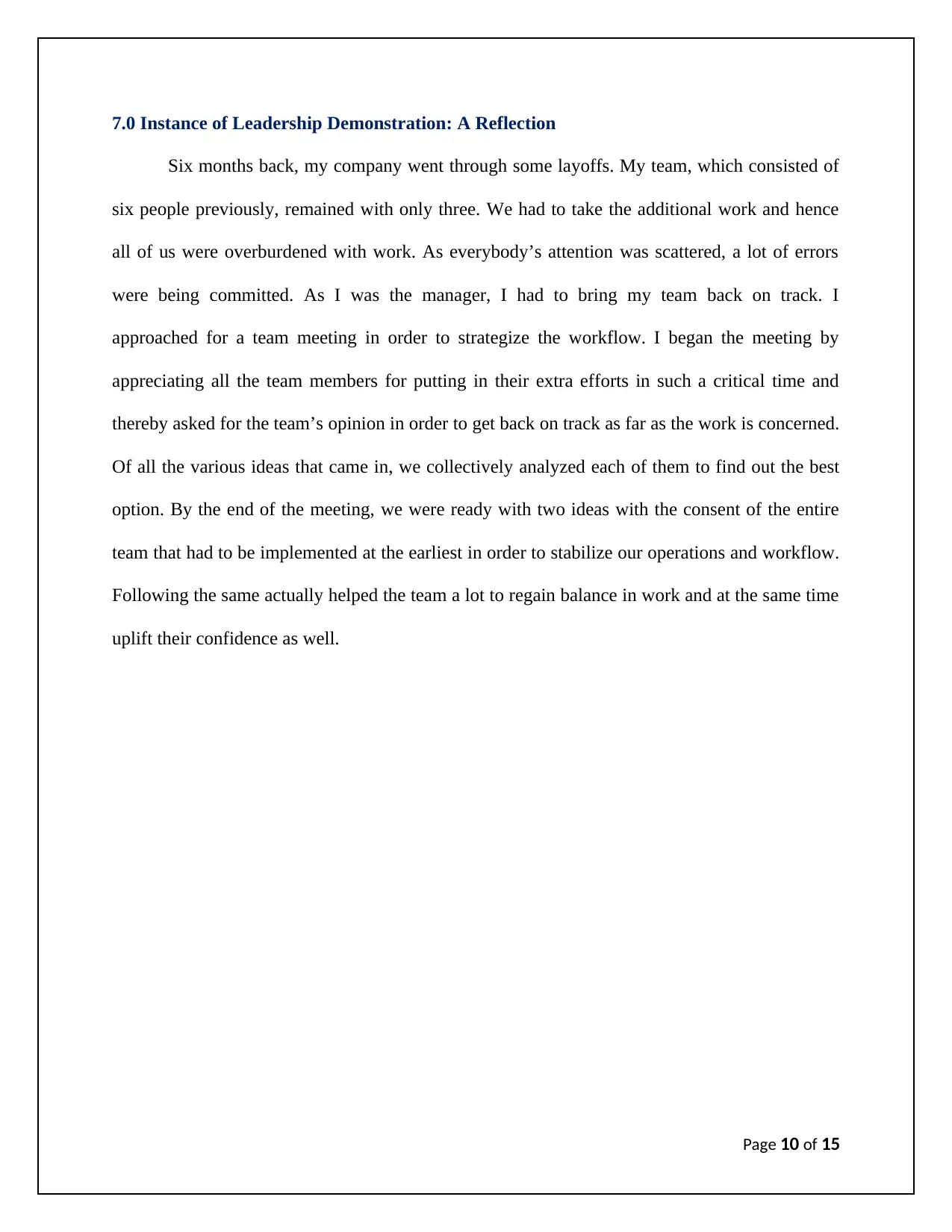
7.0 Instance of Leadership Demonstration: A Reflection
Six months back, my company went through some layoffs. My team, which consisted of
six people previously, remained with only three. We had to take the additional work and hence
all of us were overburdened with work. As everybody’s attention was scattered, a lot of errors
were being committed. As I was the manager, I had to bring my team back on track. I
approached for a team meeting in order to strategize the workflow. I began the meeting by
appreciating all the team members for putting in their extra efforts in such a critical time and
thereby asked for the team’s opinion in order to get back on track as far as the work is concerned.
Of all the various ideas that came in, we collectively analyzed each of them to find out the best
option. By the end of the meeting, we were ready with two ideas with the consent of the entire
team that had to be implemented at the earliest in order to stabilize our operations and workflow.
Following the same actually helped the team a lot to regain balance in work and at the same time
uplift their confidence as well.
Page 10 of 15
Six months back, my company went through some layoffs. My team, which consisted of
six people previously, remained with only three. We had to take the additional work and hence
all of us were overburdened with work. As everybody’s attention was scattered, a lot of errors
were being committed. As I was the manager, I had to bring my team back on track. I
approached for a team meeting in order to strategize the workflow. I began the meeting by
appreciating all the team members for putting in their extra efforts in such a critical time and
thereby asked for the team’s opinion in order to get back on track as far as the work is concerned.
Of all the various ideas that came in, we collectively analyzed each of them to find out the best
option. By the end of the meeting, we were ready with two ideas with the consent of the entire
team that had to be implemented at the earliest in order to stabilize our operations and workflow.
Following the same actually helped the team a lot to regain balance in work and at the same time
uplift their confidence as well.
Page 10 of 15
Paraphrase This Document
Need a fresh take? Get an instant paraphrase of this document with our AI Paraphraser
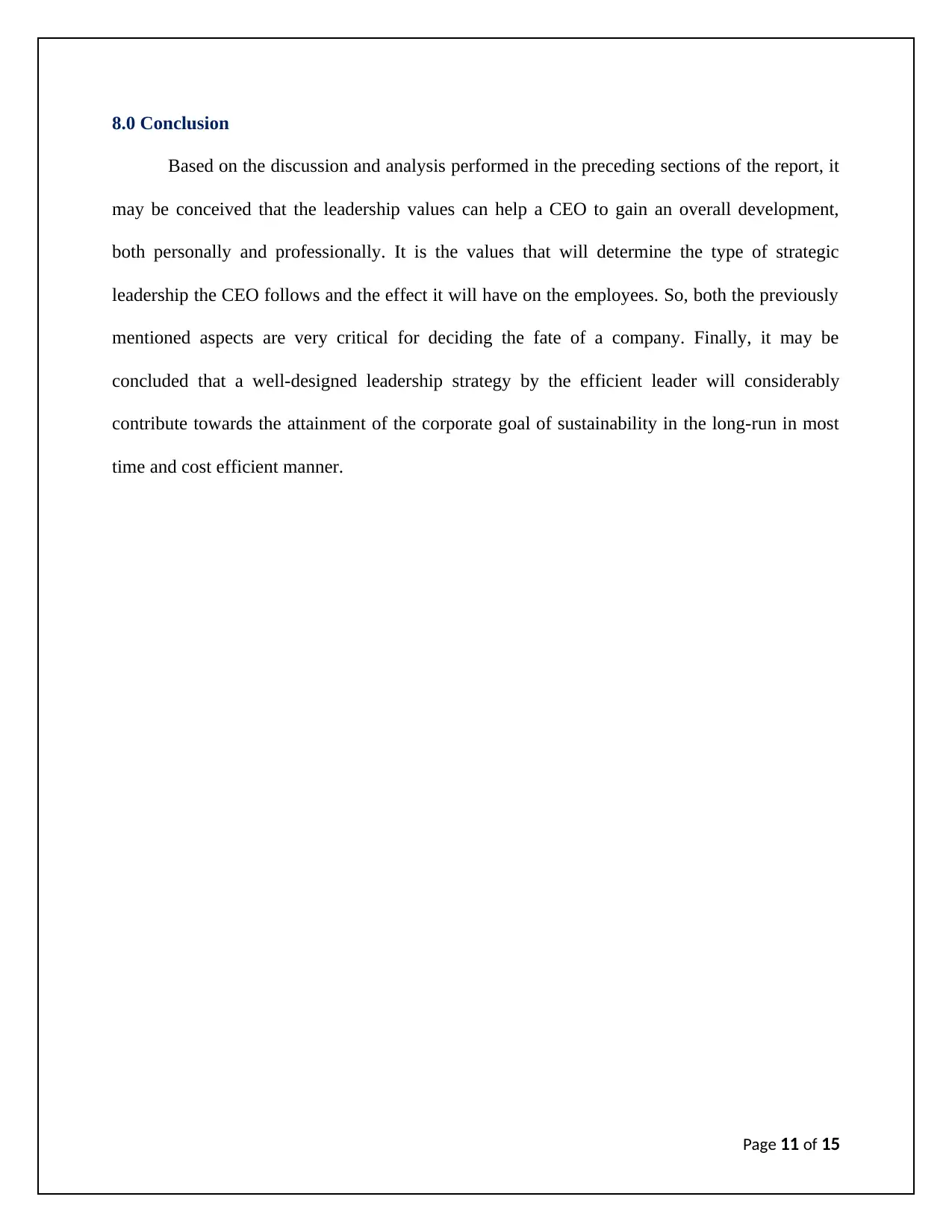
8.0 Conclusion
Based on the discussion and analysis performed in the preceding sections of the report, it
may be conceived that the leadership values can help a CEO to gain an overall development,
both personally and professionally. It is the values that will determine the type of strategic
leadership the CEO follows and the effect it will have on the employees. So, both the previously
mentioned aspects are very critical for deciding the fate of a company. Finally, it may be
concluded that a well-designed leadership strategy by the efficient leader will considerably
contribute towards the attainment of the corporate goal of sustainability in the long-run in most
time and cost efficient manner.
Page 11 of 15
Based on the discussion and analysis performed in the preceding sections of the report, it
may be conceived that the leadership values can help a CEO to gain an overall development,
both personally and professionally. It is the values that will determine the type of strategic
leadership the CEO follows and the effect it will have on the employees. So, both the previously
mentioned aspects are very critical for deciding the fate of a company. Finally, it may be
concluded that a well-designed leadership strategy by the efficient leader will considerably
contribute towards the attainment of the corporate goal of sustainability in the long-run in most
time and cost efficient manner.
Page 11 of 15
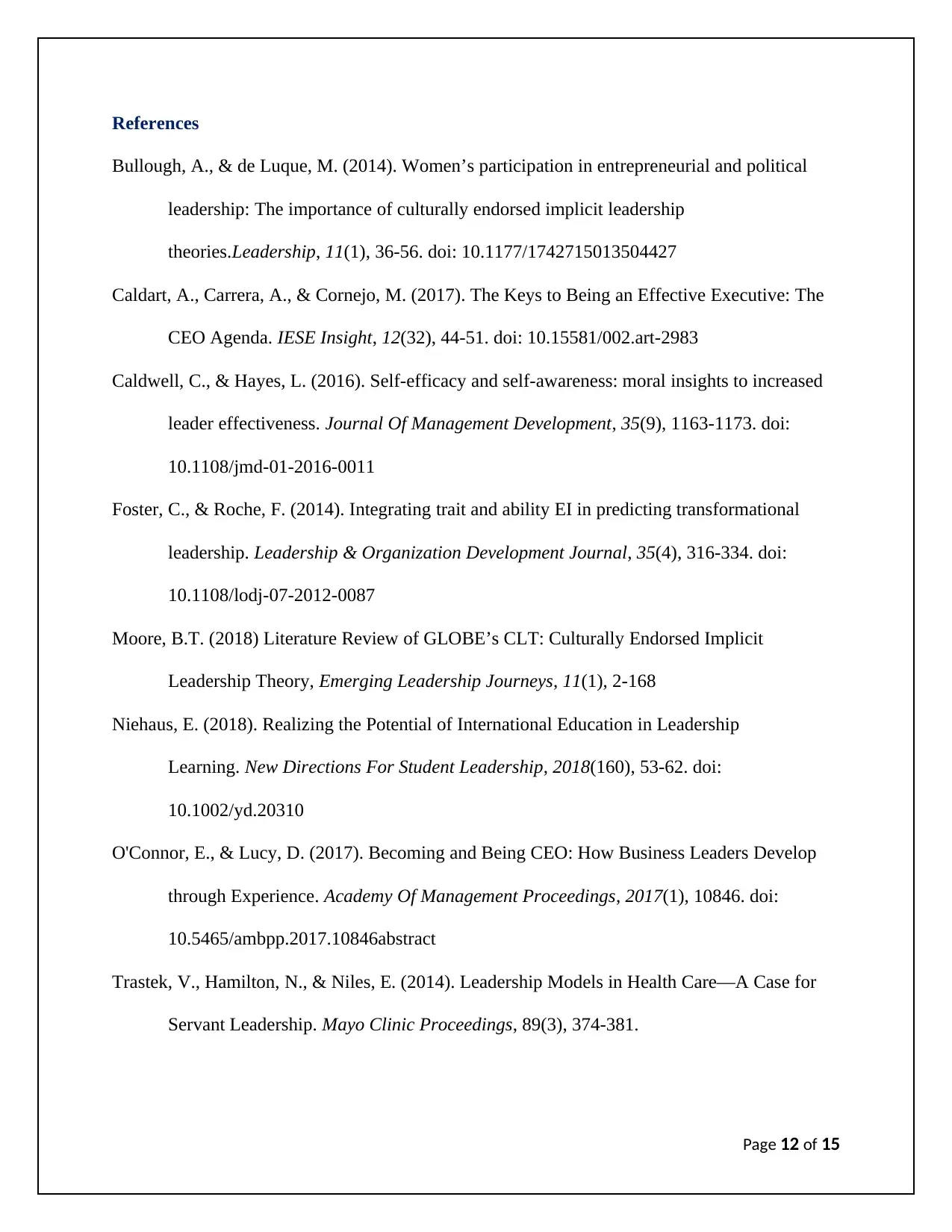
References
Bullough, A., & de Luque, M. (2014). Women’s participation in entrepreneurial and political
leadership: The importance of culturally endorsed implicit leadership
theories.Leadership, 11(1), 36-56. doi: 10.1177/1742715013504427
Caldart, A., Carrera, A., & Cornejo, M. (2017). The Keys to Being an Effective Executive: The
CEO Agenda. IESE Insight, 12(32), 44-51. doi: 10.15581/002.art-2983
Caldwell, C., & Hayes, L. (2016). Self-efficacy and self-awareness: moral insights to increased
leader effectiveness. Journal Of Management Development, 35(9), 1163-1173. doi:
10.1108/jmd-01-2016-0011
Foster, C., & Roche, F. (2014). Integrating trait and ability EI in predicting transformational
leadership. Leadership & Organization Development Journal, 35(4), 316-334. doi:
10.1108/lodj-07-2012-0087
Moore, B.T. (2018) Literature Review of GLOBE’s CLT: Culturally Endorsed Implicit
Leadership Theory, Emerging Leadership Journeys, 11(1), 2-168
Niehaus, E. (2018). Realizing the Potential of International Education in Leadership
Learning. New Directions For Student Leadership, 2018(160), 53-62. doi:
10.1002/yd.20310
O'Connor, E., & Lucy, D. (2017). Becoming and Being CEO: How Business Leaders Develop
through Experience. Academy Of Management Proceedings, 2017(1), 10846. doi:
10.5465/ambpp.2017.10846abstract
Trastek, V., Hamilton, N., & Niles, E. (2014). Leadership Models in Health Care—A Case for
Servant Leadership. Mayo Clinic Proceedings, 89(3), 374-381.
Page 12 of 15
Bullough, A., & de Luque, M. (2014). Women’s participation in entrepreneurial and political
leadership: The importance of culturally endorsed implicit leadership
theories.Leadership, 11(1), 36-56. doi: 10.1177/1742715013504427
Caldart, A., Carrera, A., & Cornejo, M. (2017). The Keys to Being an Effective Executive: The
CEO Agenda. IESE Insight, 12(32), 44-51. doi: 10.15581/002.art-2983
Caldwell, C., & Hayes, L. (2016). Self-efficacy and self-awareness: moral insights to increased
leader effectiveness. Journal Of Management Development, 35(9), 1163-1173. doi:
10.1108/jmd-01-2016-0011
Foster, C., & Roche, F. (2014). Integrating trait and ability EI in predicting transformational
leadership. Leadership & Organization Development Journal, 35(4), 316-334. doi:
10.1108/lodj-07-2012-0087
Moore, B.T. (2018) Literature Review of GLOBE’s CLT: Culturally Endorsed Implicit
Leadership Theory, Emerging Leadership Journeys, 11(1), 2-168
Niehaus, E. (2018). Realizing the Potential of International Education in Leadership
Learning. New Directions For Student Leadership, 2018(160), 53-62. doi:
10.1002/yd.20310
O'Connor, E., & Lucy, D. (2017). Becoming and Being CEO: How Business Leaders Develop
through Experience. Academy Of Management Proceedings, 2017(1), 10846. doi:
10.5465/ambpp.2017.10846abstract
Trastek, V., Hamilton, N., & Niles, E. (2014). Leadership Models in Health Care—A Case for
Servant Leadership. Mayo Clinic Proceedings, 89(3), 374-381.
Page 12 of 15
⊘ This is a preview!⊘
Do you want full access?
Subscribe today to unlock all pages.

Trusted by 1+ million students worldwide
1 out of 15
Related Documents
Your All-in-One AI-Powered Toolkit for Academic Success.
+13062052269
info@desklib.com
Available 24*7 on WhatsApp / Email
![[object Object]](/_next/static/media/star-bottom.7253800d.svg)
Unlock your academic potential
Copyright © 2020–2026 A2Z Services. All Rights Reserved. Developed and managed by ZUCOL.





